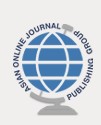Options and Strategies for Planning Water and Climate Security in the Occupied Palestinian Territories

Background: Water security is at the front and center of climate change, human security, and sustainable development in regions and communities with competing water usage contexts, climate change effects, and cross-border water-sharing agreements, resulting in conflicts arising. Shared water agreements are affected by geopolitics, segregation, water availability, and access rights. Climate change can worsen water problems by changing precipitation trends or causing droughts. (2) Methods: Document and content analysis and primary and secondary data assessment were used to develop spatio-temporal patterns. In establishing a water security narrative for the region, the selection of SDG 6 (water) and SDG 13 (climate action) targets and indicators was also evaluated. UN-Water’s 2013 water security conceptual framework was used to examine water and climate security concerns and give a set of principles to assess gaps and fulfill needs toward a ‘water security future’ for communities and states in the region. Also, hydro-political perspectives in the region or state were evaluated using discourse analysis and guiding notes from emerging scholarship to support suggestions and prospective solutions toward mitigating water insecurity and risks from climate change and disasters, including resource (water) related conflicts. (3) Results: Hydro-hegemony keeps the water sector in one state under massive stress, and the lack of consensus-building for the regional water agenda continues to breed conflicts between communities and states. (4) Conclusions: We reiterate that the escalating water and climate crises will deepen, and at the national and local scale for OPT, the restrictions and geopolitical tensions about shared waters can render coping and adaptation mechanisms for people and stakeholders challenging.







